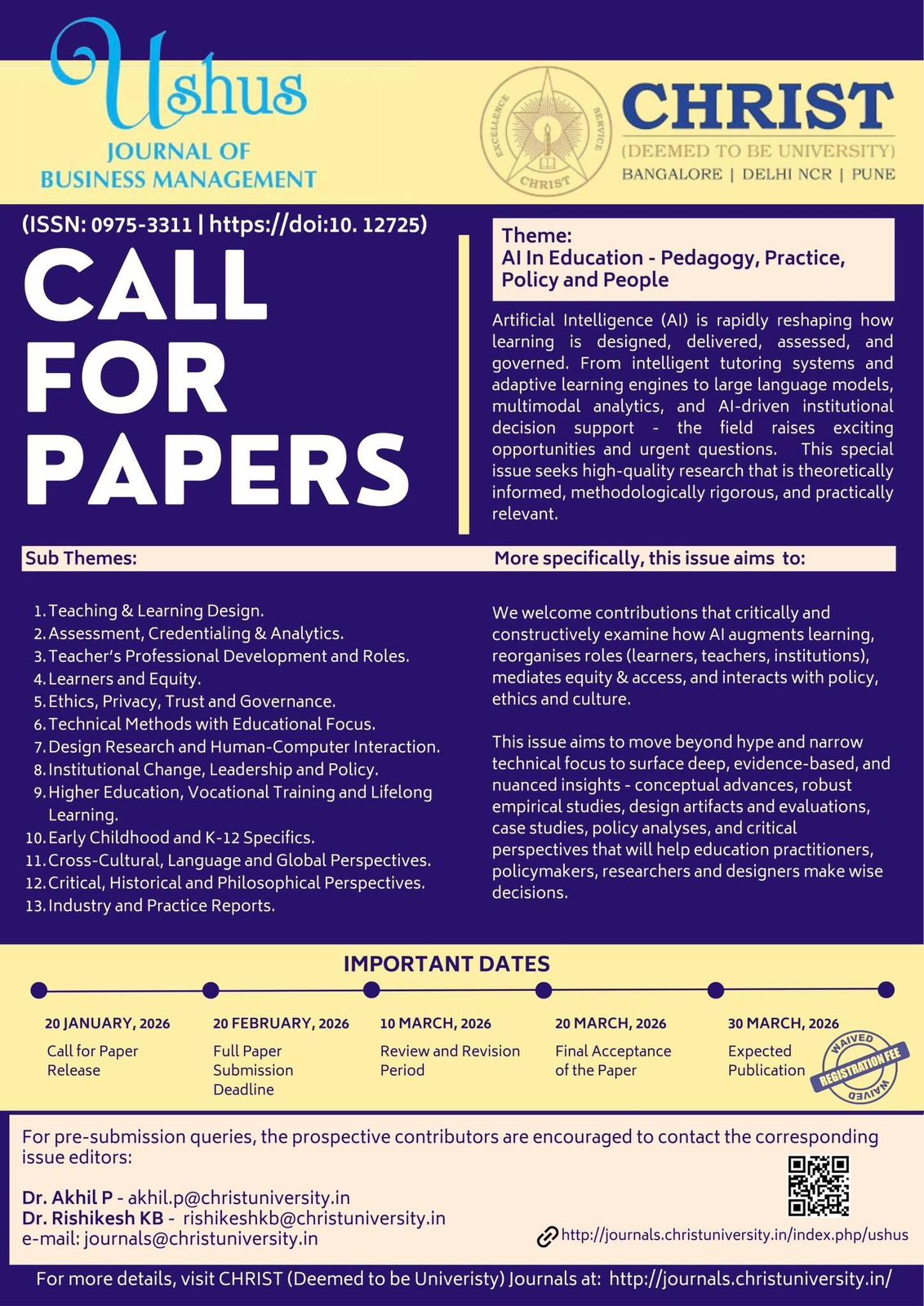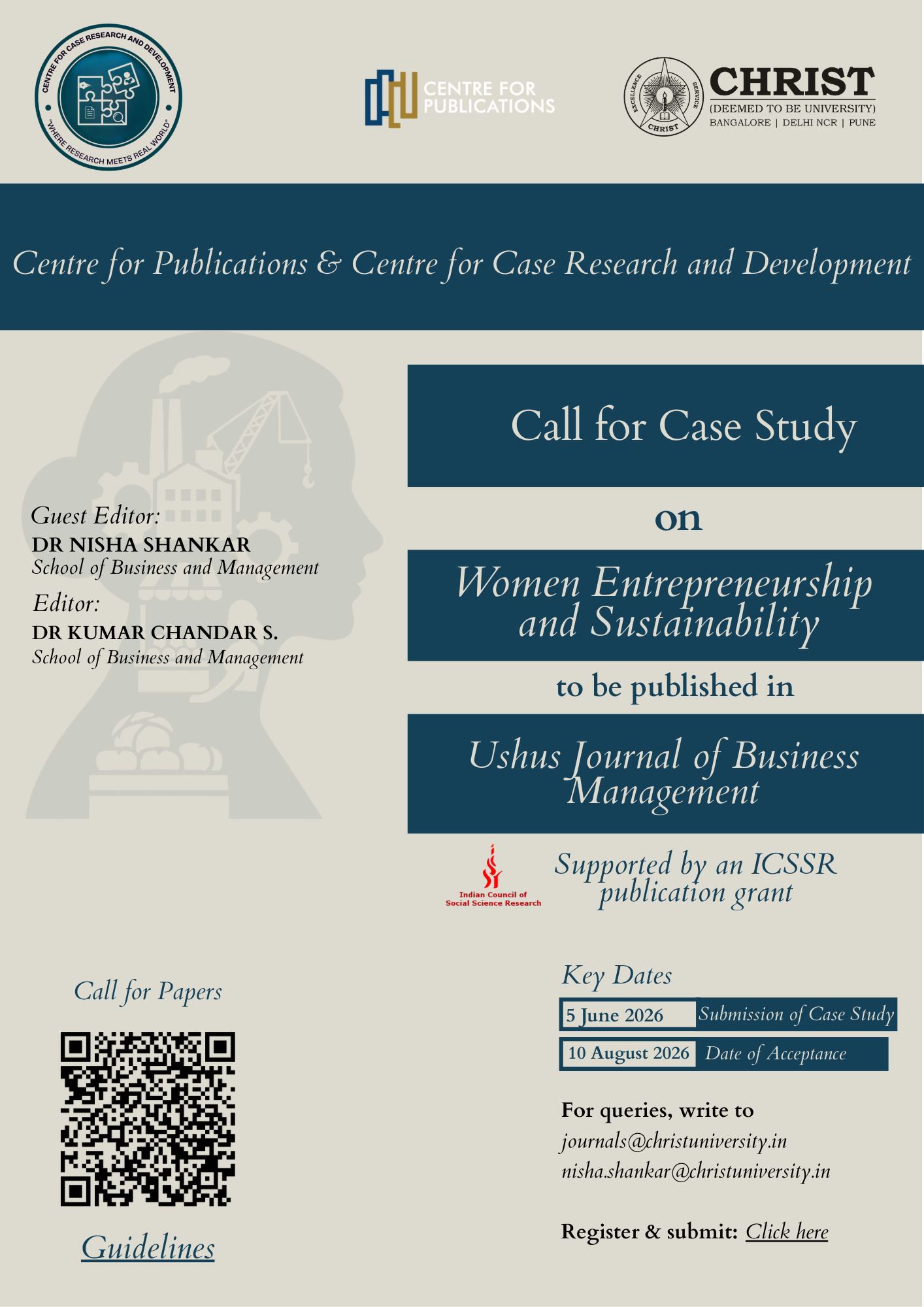A Casual Study on Impact of Green HRM Practices on Organisation Sustainability
DOI:
https://doi.org/10.12725/ujbm.53.2Keywords:
Sustainability, Green HR, EnvironmentAbstract
Nowadays, our business environment has changed its
view from a traditional financial perspective to
competency based and strategic based perspective. The
green movement across the world has given birth to the
concept of Green HRM. The concept became popular
owing to the issues in the present business world, ranging
from excessive consumption of natural resources, carbon
credits, global warming, to pollution. All these results in
serious industrial accidents decrease in life span, changes
in climate, etc. In general, Green HR deals with practicing
all HR activities with environment-friendly concerns.
This, in turn, helps in the sustainability of businesses as
well as the employees. Nevertheless, there is a wide crack
between the HRM and environmental facets. Therefore
there is an emerging requirement for research in
articulating green HR approaches and their suggestions
on general business execution. The reason behind this
investigation is to talk about the ideas of green HRM and
its impact on organisation sustainability with the help of
extensive review of the literature.
References
Becker, B. E., & Huselid, M. A. (2006). Strategic human resource
management: Where do we go from here? Journal of Management,
(6), 898–925.
Bowen, D. E., & Ostroff, C. (2004). Understanding HRM-fi rm
performance linkages: The role of the “strength” of the HRM system.
Academy of Management Review, 29(2), 203–221.
Burke, M. J., Borucki, C. C., & Kaufman, J. D. (2002). Con- temporary
perspectives on the study of psychological climate: A commentary.
European Journal of Work and Organizational Psychology, 11(3), 325–340.
Dumont, J., Shen, J., & Deng, X. (2017). Effects of green HRM practices on
employee workplace green behavior: The role of psychological green
climate and employee green values. Human resource management, 56(4),
-627.
Fernández, E., Junquera, B., & Ordiz, M. (2003). Organizational culture
and human resources in the environmental issue: a review of the
literature. International Journal of Human Resource Management, 14(4),
-656.
Guerci, M., Longoni, A., & Luzzini, D. (2016). Translating stakeholder
pressures into environmental performance-the mediating role of
green HRM practices. International Journal of Human Resource
Management,Taylor & Francis (Routledge), 27(2), 262–289.
Hoffman, A. J.(2009). Shades of green. Stanford Social Innovation Review,
–49. Web page accessed in April 2018. Available:
https://ssir.org/articles/entry/shades_of_green.
Ji, L., Huang, J., Liu, Z., Zhu, H., & Cai, Z. (2012). The effects of employee
training on the relationship between environmental attitude and firms’performance in sustainable development. The International
Journal of Human Resource Management, 23(14), 2995-3008.
Jiang, K., Lepak, D. P., Hu, J., & Baer, J. C. (2012). How does human
resource management infl uence organisational outcomes? A metaanalytic investigation of mediating mechanisms. Academy of
Management Journal, 55(6), 1264–1294.
Kim, Y. J., Kim, W. G., Choi, H. M., & Phetvaroon, K. (2019). The effect of
green human resource management on hotel employees’ eco-friendly
behavior and environmental performance. International Journal of
Hospitality Management, 76, 83–93.
Mandip, G. (2012). Green HRM: People Management Commitment to
Environmental Sustainability. Research Journal of Recent Sciences,1.
Mathapati, C. M. (2013). Green HRM: A strategic facet. Tactful Management
Research Journal, 2(2), 1–6.
Md. Hosain, S., & Md. Rahman, S. (2016). “ Green ” Human Resource
Management - a. Journal of Business and Management, 18, 54–59.
Nishii, L. H., Lepak, D. P., & Schneider, B. (2008). Employee attributions of
the “why” of HR practices: Their effects on employee attitudes and
behaviors, and customer satis- faction. Personnel Psychology, 61(3),
–545.
Raj, R., & Verma, A. (2019). Green Human Resource Management
Practices on Environmental Performance : A Conceptual Note. Our
Heritage Journal, 67, 236–245.
Singh, S. K., Giudice, M. Del, Chierici, R., & Graziano, D. (2020). Green
innovation and environmental performance: The role of green
transformational leadership and green human resource management.
Technological Forecasting and Social Change, 150, 119762.
Siyambalapitiya, J., Zhang, X., & Liu, X. (2018). Green human resource
management: A proposed model in the context of Sri Lanka’s tourism
industry. Journal of Cleaner Production, 201, 542–555.
Vij, P., Suri, S., & Singh, S. (2013). International Journal of Marketing and
Human Resource Management (IJMHRM), 4(2), 19–25.
Wales, T. (2013). Organisational sustainability: What it is, and why does it
matter? Review of Enterprise and Management Studies, 1(1), 38–49.
Yu, W., Chavez, R., Feng, M., Wong, C. Y., & Fynes, B. (2020). Green
human resource management and environmental cooperation: An
ability-motivation-opportunity and contingency perspective.
International Journal of Production Economics, 219, 224–235.



